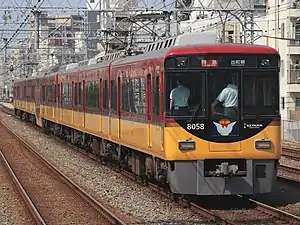Keihan 8000 series
The Keihan 8000 series (京阪8000系, Keihan 8000-kei) is an electric multiple unit (EMU) limited express train type operated by the private railway operator Keihan Electric Railway in Japan since 1989.[1]
| Keihan 8000 series Elegant Saloon | |
|---|---|
 Set 8005 on the Keihan Main Line in August 2017 | |
| Manufacturer | Kawasaki Heavy Industries |
| Built at | Kobe |
| Family name | TV Car (1989–2012) Elegant Saloon |
| Replaced | 3000 series |
| Constructed | 1989–1990 |
| Entered service | 1989 |
| Refurbished | 2010–2012, 2018– |
| Number built | 80 vehicles (10 sets) |
| Number in service | 80 vehicles (10 sets) |
| Formation | 8 cars per trainset |
| Fleet numbers | 8001–8010 |
| Operator(s) | Keihan Electric Railway |
| Specifications | |
| Car body construction | Aluminium alloy Steel (Type 8800 bilevel car) |
| Car length | 18 m (59 ft 1 in) |
| Doors | 2 per side 1 per side (Type 8550 "Premium Car") |
| Maximum speed | 110 km/h (70 mph) |
| Traction system | Field phase control |
| Electric system(s) | 1,500 V DC |
| Current collector(s) | Overhead wire |
| Safety system(s) | Keihan ATS |
| Track gauge | 1,435 mm (4 ft 8+1⁄2 in) |
Formations
As of 1 April 2015, the fleet consists of ten eight-car trains, formed as follows with four motored ("M") cars and four non-powered trailer ("T") cars.[2]
| Car No. | 1 | 2 | 3 | 4 | 5 | 6 | 7 | 8 |
|---|---|---|---|---|---|---|---|---|
| Designation | Mc1 | M2 | T2 | TD | T3 | T | M1 | Mc2 |
| Numbering | 8000 | 8100 | 8500 | 8800 | 8750 | 8550 | 8150 | 8050 |
- The TD car is a bilevel car.[2]
- The MC1 and M1 cars each have two scissors-type pantographs.[2]
Interior
 The interior of driving car 8059 in September 2014
The interior of driving car 8059 in September 2014 The interior of driving car 8059 in September 2014
The interior of driving car 8059 in September 2014 Priority seating and a wheelchair space in car 8151 in March 2011
Priority seating and a wheelchair space in car 8151 in March 2011 The lower deck of a type 8800 bilevel car in July 2014
The lower deck of a type 8800 bilevel car in July 2014 The interior of "Premium Car" 8551 in August 2017
The interior of "Premium Car" 8551 in August 2017
History
The 8000 series trains were introduced between 1989 and 1990, initially operating as seven-car sets.[1] They were lengthened to eight cars per set with the addition of a type 8800 bilevel car from fiscal 1997.[1] Use of the bilevel car does not incur a standalone surcharge.
Between 2008 and 2010, the fleet was repainted in a new colour scheme.[1]
 Set 8001 in original seven-car formation in 1990
Set 8001 in original seven-car formation in 1990 Set 8005 in the original livery in April 2008
Set 8005 in the original livery in April 2008 Reliveried set 8008 on the Keihan Main Line in July 2008
Reliveried set 8008 on the Keihan Main Line in July 2008
Refurbishment
Between March 2010 and November 2012, the fleet underwent a programme of refurbishment, which also included interior changes.[1][3]
Since 2018, the fleet has been receiving LED destination displays and updated interior lighting.[4]: 3
Premium Car introduction

In 2017,[4] car 6 of each set was modified to become a "Premium Car" with 2+1 abreast reclining seating ahead of the introduction of reserved-seating limited express services on 20 August 2017, which incurs a surcharge.[5] Modifications include the elimination of one doorway on each side. Seating accommodation is provided for 40 passengers with a seat width of 460 mm (18 in) (compared with 430 mm (17 in) for seating in other cars) and seat pitch of 1,020 mm (40 in) (compared with 920 mm (36 in) for seating in other cars).[5] AC power outlets are provided for each seat.[5] To accommodate the cars' modifications, the fleet was provisionally operated as seven-car sets from September 2016.[6][7]
References
- 私鉄車両年鑑2012 [Japan Private Railways Annual 2012]. Tokyo, Japan: Ikaros Publications Ltd. February 2012. p. 87. ISBN 978-4-86320-549-9.
- 私鉄車両編成表 2015 [Private Railway Rolling Stock Formations – 2015] (in Japanese). Japan: Kotsu Shimbunsha. 23 July 2015. p. 132. ISBN 978-4-330-58415-7.
- 京阪8000系のリニューアルが完了 [Keihan 8000 series refurbishment complete]. Japan Railfan Magazine Online (in Japanese). Japan: Koyusha Co., Ltd. 16 November 2012. Archived from the original on 18 November 2012. Retrieved 17 November 2012.
- 京阪8000系「プレミアムカー」だけでない贅沢空間 [The Keihan 8000 series "Premium Car" is more than just a luxurious space]. Toyo Keizai Online (in Japanese). 16 March 2023. Archived from the original on 23 March 2023. Retrieved 8 April 2023.
- 京阪電気鉄道「プレミアムカー」 [Keihan Electric Railway "Premium Car"]. Japan Railfan Magazine (in Japanese). Vol. 57, no. 676. Japan: Koyusha Co., Ltd. August 2017. pp. 70–71.
- 京阪8000系の一部が7両編成化される [Part of the Keihan 8000 series fleet shortened to 7-car trains]. Japan Railfan Magazine Online (in Japanese). Japan: Koyusha Co., Ltd. 25 September 2016. Archived from the original on 14 December 2021. Retrieved 8 April 2023.
- 京阪8000系がすべて7両編成に [All Keihan 8000 series sets are 7 cars]. Japan Railfan Magazine Online (in Japanese). Japan: Koyusha Co., Ltd. 26 February 2017. Archived from the original on 14 December 2021. Retrieved 8 April 2023.
External links
- Official website (in Japanese)